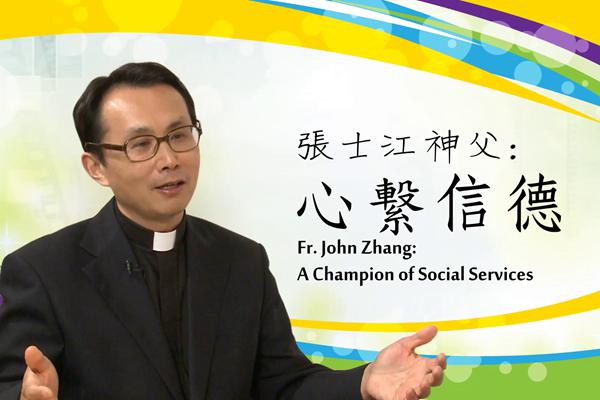THE EDITOR: Fr.John B. Zhang, Director of Faith Institute for Cultural Studies, delivered a speech at the opening ceremony of the conference themed "Matteo Ricci and Nanchang: Inculturation of the Church in China." He mentioned the questionnaires on the issue of Christians remembering their ancestors, as well as his thoughts regarding the issue on how to localize the church.
How to localize the church is a challenge faced by both Catholicism and Christianity in China.
I remember that many years ago, an enthusiastic senior elder said to me in pride: "We believers do not burn incense, offer sacrifices to ancestors or engage in superstition! Our church's practice is different from non-believers' and we will remain unique." Take another example in translation. Should "Matteo Ricci" be translated in Chinese style (last name + first name) or literally translated yet remain in a Western way (first name + last name)? Should "The Church in China" be rendered as "Chinese-styled Church" or "Church in China"? Many Christians still believe that offering sacrifices to dead ancestors is not necessary and as a result, few lay importance on practicing it.
In fact, this outdated idea is influenced deeply by Jewish-Greco-Roman cultures and the Western colonial ideology since the 19th century. However, it is not good for the healthy development of today's Chinese church as it is a barrier for the Chinese church to become localized.
The "etiquette dispute" that lasted for 300 years had long been history. In 1939, Pontifical has openly admitted that worshiping heaven and offering sacrifices to dead ancestors is not a religious ritual. Though it seems that believers of Christ are allowed to do them, very few have been positive in practicing them. Furthermore, churches from different places are not positive doing it on Sweep Clean Day and on the eve of the Spring Festival either.
In order to understand this situation, to strengthen research and give the localization of church a push, the Department of Religion in the School of Philosophy at Fudan University, together with the Faith Institute for Cultural Studies, prepared ten special questions which has been published on ChinaCatholic.org and ChristianTimes.cn a week before. If you want to understand the truth, you may go to this link to see the results.
In the past, the Chinese church was developed in a Westernized way and failed to integrate into the mainstream society of China in the traditional cultural level. As a result, we had to bear the burden of "being called a foreign religion" for more than 100 years. Today, we should take off the Jewish - Greek - Roman traditional coat, and put on a Jewish - Roman - Chinese cultural tradition of new clothes. It is a long and arduous task for the Chinese church to become localized. Therefore, all levels of the church must pay attention to actively face the challenges of overcome difficulties of localization of the church and continue to work for the goal.
Concerning the history of the localization of the Chinese church, it can be traced as far back to the late Ming and early Qing Dynasty when Matteo Ricci tried to achieve it as the first person in China using a unique strategy to adapt to Chinese cultures. He had tried to adapt himself in the areas of construction, clothing, translation of names and cultural practices, which was effective. We can also trace it in a recent event. After experiencing the Boxer rebellion and the movement to oppose Christianity, led by Chinese intellectuals from 1922 to 1927, the church started to reflect and emphasize the importance of localization. Take Catholicism for instance. Priests Celso Benigno Luigi Costantini and Lei Mingyuan has exhausted themselves to make the Chinese Church local. And in the reformed church, many have made great contributions to it as well, including Richard Wilhelm, James Hudson Taylor, Jing Dianying, Rev.Richard Wurmbrand, Young John Allen, John Livingstone Nevius, Calvin Wilson Matteer, Hunter Corbett, Zhao Zichen, and Wu Leichuan.
We can learn from Buddhism about how to localize a foreign religion. Why did Christianity have such difficulty coming into Chinese culture as Buddhism did though they were both foreign religions? It was caused by the collision of two dominant cultures. In the globalization and urbanization of the Chinese, both cultures have to lower themselves to listen to each other in humility and communicate with each other in order to accept each other in order to live together in harmony in one earth.
With regards to the theological basis of localization of the church, the former president of the Jesuit sector, Father Pedro Arrupe, was inspired by the mystery of the birth of the Son, which he believed to be the greatest reason for localization and the best model of "localization." He said "The church should follow Jesus, entering in the most intimate way into various cultures, and accept the value of the local culture, adapt and respect the local culture in order to express the faith acceptable to the locals. When the church brings in Christ's unique salvation to a place, it should renew, uplift and contribute to its local culture with the Gospel. (Christianity has contributed to Chinese culture in promoting monogamy, stopping infanticide, and helping people to pay attention to equality between men and women, etc)"
In other words, by "localization", we need to appreciate and respect the local culture and use it to express the Christian faith on one hand. On the other hand, Christianity should renew, cleanse and uplift and contribute to the local culture.
Translated By: Alvin Zhou










